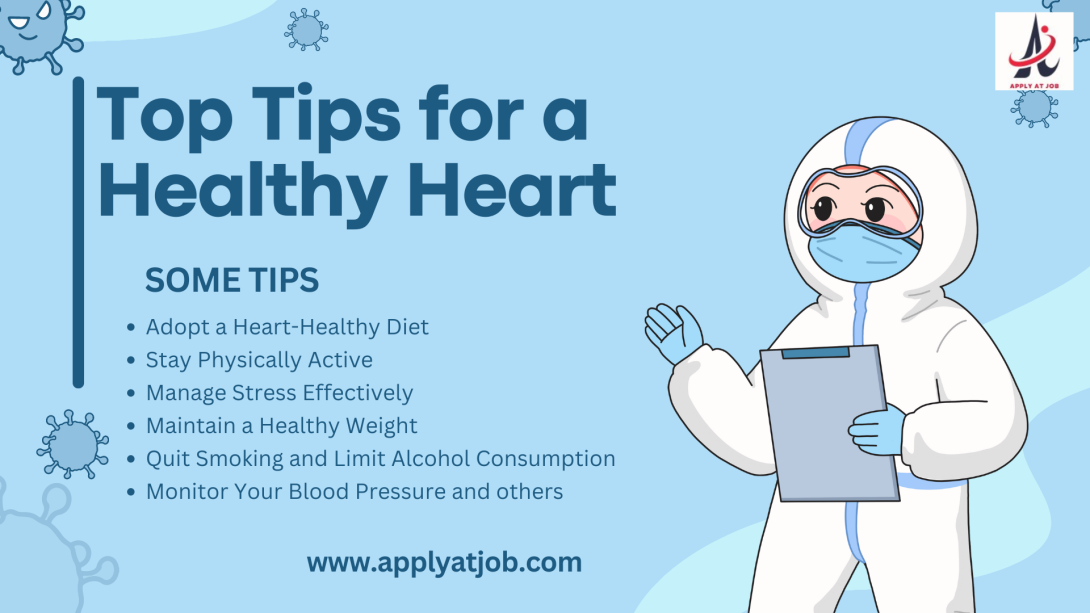
Best Heart Health Advice: Maintain a Strong and Healthy Heart
One of the most important organs in your body, the heart is in charge of circulating blood and oxygen throughout the body. Maintaining heart health is critical for enhancing general health, lowering heart disease risk, and encouraging a long, active life. We'll go over the best practices for keeping your heart healthy in this blog, including food, exercise, and lifestyle adjustments.
1. Make the Diet Heart-Healthy
Maintaining a healthy heart is mostly dependent on eating a nutritious and well-balanced diet. Here are some important dietary guidelines:
. Increase your intake of fruits: and vegetables by aiming for five servings or more each day. They provide a lot of fiber, vitamins, and minerals, which decrease blood pressure and cholesterol.
. Go for whole grains: Heart health is enhanced by the vital minerals and fiber found in whole grains like quinoa, brown rice, and oats.
. Add in some good fats: Choose unsaturated fat sources like almonds, avocados, and olive oil over trans fats, which are included in processed and fried meals.
. Restrict salt intake: Consuming too much salt can raise blood pressure, so aim to keep your daily salt intake to no more than 2,300 mg, or around one teaspoon.
. Cut back on sugar: Consuming too much sugar can cause weight gain, elevated cholesterol, and diabetes, all of which are heart disease risk factors.
2. Continue Your Physical Activity
Frequent exercise helps maintain a healthy weight, strengthens the heart muscle, and enhances circulation. Try to get in at least 150 minutes a week of either 75 minutes of intense exercise or 150 minutes of moderate aerobic activity.
. Cardiovascular workouts: Swimming, cycling, running, and brisk walking are all excellent cardiovascular exercises.
. Strength training: Including resistance training, such as weightlifting, two days a week helps increase muscle mass and boost metabolism.
. Keep moving throughout the day: Easy routines like stretching, walking at breaks, and using the stairs can raise your level of physical activity.
3. Effectively Handle Stress
Persistent stress can harm your heart by raising blood pressure and encouraging bad behaviors like smoking, binge eating, or drinking alcohol. Here are some pointers for reducing stress:
. Engage in mindfulness exercises: Yoga, deep breathing, and meditation are all effective ways to unwind and reduce stress.
. Get adequate sleep: To help your body and mind recuperate from everyday pressures, aim for 7-9 hours of good sleep every night.
. Maintain social connections: Participating in social activities and spending time with loved ones can enhance mental health and lower stress levels.
4. Continue to Eat a Healthy Weight
Being fat or overweight raises your risk of heart disease since being overweight can cause diabetes, high blood pressure, and cholesterol issues.
In order to keep a healthy weight:
. Keep an eye on the calories you consume: Consume the appropriate amount of calories for your age, gender, and degree of exercise.
. Continue to be physically active: Frequent exercise aids in weight loss or maintenance by burning calories.
. Steer clear of crash diets: and concentrate on sustainable, long-term eating practices instead than short solutions.
5. Give Up Smoking and Reduce Alcohol Use
Because it destroys blood vessels, lowers blood oxygen levels, and increases blood pressure, smoking is one of the biggest risk factors for heart disease. One of the finest things you can do for your heart is to stop smoking.
. Join a program: to help you stop smoking, or take nicotine replacement therapy if necessary, to get the assistance you need to stop smoking.
. Limit your alcohol intake: since it might cause blood pressure to rise and heart disease. Limit your alcohol consumption to one drink for ladies and two for males each day.
6. Check Your Blood Pressure and Cholesterol Levels
High blood pressure and elevated cholesterol are major risk factors for heart disease, but they are sometimes referred to as "silent killers" because they may not present symptoms. Regular monitoring and early intervention can prevent heart problems. Frequent monitoring involves taking your blood pressure at home or during routine doctor visits. Regular monitoring of your cholesterol levels should be done every four to six years, or more frequently if you have heart disease risk factors.
7. Regulate Blood Sugar Levels
Elevated blood sugar levels can harm the heart-controlling blood vessels and neurons. Controlling blood sugar is essential, particularly if you already have diabetes or are at risk of getting it.
. Consume a healthy: balanced diet that includes lots of fiber, lean meats, and whole grains to help control blood sugar levels.
. Remain active: Frequent exercise enhances insulin sensitivity and lowers blood sugar.
If your doctor prescribes medicine to regulate your blood sugar, use it as directed. Pay close attention to their recommendations.
8. Continue Learning About Your Lineage
Understanding your risk factors might be aided by being aware of any family history of heart disease. See your doctor about early tests and preventive steps to reduce your risk if heart disease runs in your family.
9. Continue to Schedule Regular Medical Exams
Your healthcare practitioner may monitor your heart health, look for risk factors, and offer advice on preventative steps during routine medical examinations.
It's critical to continue with routine screenings like:
. checking of blood pressure
. Tests for cholesterol levels
. Measurements of blood sugar
. If required, electrocardiograms (EKGs)
Conclusion:
Living a long and active life requires keeping your heart healthy. You may dramatically reduce your chance of developing heart disease by eating a heart-healthy diet, exercising regularly, controlling your stress, and abstaining from dangerous habits like smoking and binge drinking. Don't forget to routinely check your blood pressure, cholesterol, and blood sugar levels. You may also get specialized recommendations from your healthcare professional.
You can visit our site: Applyatjob.com
https://applyatjob.com/hiring-employee
https://applyatjob.com/jobs




